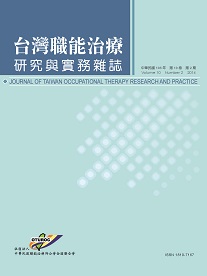Journal of Taiwan Occupational Therapy Research and Practice

半年刊,正常發行
目的:心衰竭是一種進行性臨床綜合症狀,由於其患病率增加,發病率和死亡率高,以及醫療保健費用迅速增加而成為重要的心血管疾病。而心衰竭常見的症狀,如心悸、呼吸困難,常會影響個案日常生活活動執行、生活獨立性、社會及角色的功能,因此造成生活品質下降。為了減少因疾病造成對生活的衝擊、生活品質下降及再次入院,心衰竭個案需要學習自我照護的能力及自我管理的行為。故本文探討心衰竭個案在接受門診職能治療後之成效。方法:一名 61 歲男性,右心衰竭個案,接受每週一次職能治療,為期 3 個月,介入內容以執行能量節省能量和工作簡化的衛教,教導及模擬正確進行活動的方法為主。在介入前與介入後進行評估測驗,內容包含活動中、活動後使用伯格式身體活動自覺用力量表 (Borg Rate of Perceived Exertion Scale, Borg RPE Scale) 來主觀評量費力的狀況,利用加拿大職能表現評量 (Canadian Occupational Performance Measure, COPM) 確認個案的職能問題,及檢視個案自覺職能表現的改變及滿意度,而台灣簡明版世界衛生組織生活品質問卷 (WHOQOL-BREF-Taiwan Version) 是了解個案的生活品質。結果:經由個別化的職能治療後,在重要的日常生活活動中(上下樓、洗澡),自覺用力係數的改善反映了功能的進展,Borg RPE Scale 分數最少進步達 2 分以上。在 COPM 評估上,個案的表現及滿意度差異皆達 2 分以上,而生活品質量表的各範疇分數,除了社會關係及環境範疇的前後測分數不變以外,整體生活品質、一般健康、生理健康、心理健康的範疇分數最少進步達 1 分以上。結論:心衰竭個案可能缺乏執行活動的調適策略,進一步產生自我設限,而利用職能治療著實可以引導個案調整生活型態,管理日常生活活動,發展因應策略,進而提升生活活動參與,增加自我管理的自信和安適感。
Objective: Heart failure (HF) is a progressive clinical syndrome, which has become an important cardiovascular disease due to its increasing prevalence, high morbidity and mortality, and a substantial burden to the health-care system. Individuals with HF experience common symptoms such as palpitations and dyspnea that often affect the execution of daily activities, functional independence, social and role functions. As result, it causes a decreased quality of life. In order to reduce life shock, the decrease of the quality of life and readmission caused by the disease, individuals with heart failure need to learn the ability of self-care and self-management behaviors. This case report illustrates the effectiveness for an individual with heart failure who received outpatient occupational therapy. Method: A 61-year-old man with right heart failure received occupational therapy once a week for 3 months. The intervention included education for energy conservation and work simplification strategies, and teaching the patient the correct skills in the simulating activity. In order to evaluate the results, and a series of assessments were conducted: self-perception of occupational performance (Canadian Occupational Performance Measure, COPM), level of perceived exertion during activity (Borg Rate of Perceived Exertion Scale, Borg RPE Scale) and quality of life (WHOQOL-BREF-Taiwan Version). Results: As a result of the therapeutic intervention, the patient’s functional progress was reflected by the improvements of RPE for the most important ADL (up and down stairs, bathing). The score of Borg RPE Scale had improved over 2 points. Using the COPM, the performance score and satisfaction score had all improved over 2 points. And it had also shown improvement in quality of life. The most of WHOQOL-BREF-Taiwan Version scores (Global items, General health, Physical health, and Psychological health) had improved over 1 points. Conclusions: Individuals with heart failure may lack adjustment strategies during activity, resulting in self-limitation. In the practice of Occupational therapy, an individual can adjust lifestyle, manage daily routines, and develop copying skills to enhance life participation and to increase self-efficacy of self-management and well-being.












